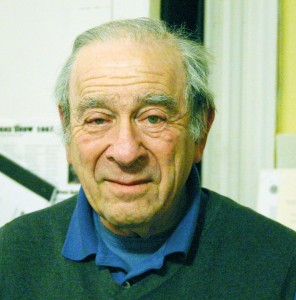ABC Board Spotlight: George Hein
 In the modern world, a general search on George Hein will most likely reveal numerous hits relating to museums. Alluding most recently to his 1998 published work entitled Learning in the Museum, most websites sport a conglomeration of praising Mr. Hein for his contribution to educational theories as well as in museology. The book itself examines the modern role of museums in education as well as progressive institutions of a democracy.
In the modern world, a general search on George Hein will most likely reveal numerous hits relating to museums. Alluding most recently to his 1998 published work entitled Learning in the Museum, most websites sport a conglomeration of praising Mr. Hein for his contribution to educational theories as well as in museology. The book itself examines the modern role of museums in education as well as progressive institutions of a democracy.
It is easy to be simply amazed by Hein’s breadth of knowledge in educational theory, as well his application of those of other famous theorists such as Dewey, Piaget, Vygotsky. His work aims to use visitor studies and existing theories on education to understand exactly how museums contribute to education and how they can best serve this role. In doing so, Heins’ concludes that exhibitions which are physically, socially, and intellectually accessible to every single visitor, what he calls a ‘constructivist museum’, best serve a democratic society in a progressive way.
Amongst all this talent surrounding museum analysis however, there are a few more fascinating things about Heins’ life that might be missed at first glance. First and foremost, that he was formerly trained as a chemist. Mr.Hein received his B.A. from Cornell University (1954) and MS (1957) and PhD (1959) degrees in chemistry from the University of Michigan. In fact, he has worked in biochemical research at CalTech, Boston University, and Harvard Medical School prior to entering the field of education work at the Education Development Center (EDC) and Boston University.
When asked about this dramatic shift of careers, Hein says it was a combination of a few different things. Firstly, Heins’ explained, “I wanted to do something more socially useful—my research was beginning to draw support from the defense department, at a time when I opposed the US intervention in the Vietnam War.” Moreover, he pointed out the combination of many of his personal connections becoming socially active and his own growing family drew him towards an interest in children’s education.
How the shift occurred from there stemmed from Heins’ decision to actually act on these observations.
“So I left chemistry and joined a NSF funded curriculum development project, the Elementary Science Study at Education Development Center. One thing lead to another and I shifted careers to teaching science education; then moving to Lesley University and eventually, partly by chance, ending up engaged in a lot of work with science museums and becoming interested in the growing field of museum education,” explained to me.
Hein is currently a Professor Emeritus at the Lesley University Graduate School of Arts and Social Sciences and Senior Research Associate with Program Evaluation and Research Group (PERG), which he co-founded with Brenda Engel in 1976. The program has become renown for its museum education research and evaluation, and has reviewed many famous national education programs.
During 2006-7, he was president of TERC, a non-profit educational research and development organization. He has also been a Visiting Faculty in the Museum Studies Program at Leicester University; a Fulbright Research Fellow at King’s College; London, and a Research Associate for the Museum of Science (Boston).
Despite the shift in careers, he points out that both his training in chemistry and his liberal arts education at Cornell eventually strongly contributed to his work in social science. Hein explained, “I learned to reason, to insist on evidence and what it means to experiment. Besides, I believe that anything you learn thoroughly will help you in the future.”
Fortunately for ABC, Hein has been a long time Agassiz resident and a strong supporter of the arts here. His passion for the role of museums in education, allowed him to be a key proponent of the construction of the Maud Morgan Arts Center. As a board member Hein strongly believes the arts programs here, and in public education, are integral to the cultivation of a creative mind. This cultivation, he pointed out, is simply invaluable.
Hein is proud of the progress MMA Center has made thus far, and hopes the it will thrive and cultivate creative young minds for years to come.



